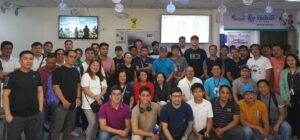In just a few years, the global maritime industry will face a perfect storm of challenges. An aging workforce, a shortage of skilled workers, and the need to adopt new technologies will combine to create a perfect storm for the maritime industry. Whether you’re an ordinary seafarer, a ship manager, or a sea captain, you’ll need to be highly skilled in several areas to meet these challenges.
Seafarers need to master a few basic skills that they will always need, regardless of technological advancements or rank. These include skills like fire prevention, basic survival and first aid, and more. However, soft skills and skills that allow seafarers to keep up with burgeoning digitalization and technological trends are essential as well in current times and even more so in the future.
Communication skills
Seafarers work in teams and vessels run best when there is open and effective communication among crew members. Learning how to communicate calmly and confidently, whether in one-on-one conversations or when speaking to a larger group, can help foster a healthy and efficient work environment. This is an especially important skill for a ship manager who has to be able to run an efficient crew.
Many people can find it difficult to communicate their thoughts and needs effectively. However, with training, practice, and encouragement, seafarers can gain the skills they need to be able to work and communicate well with others.
Problem-solving skills
Various issues regularly crop up on maritime vessels. Because of this, it’s important for seafarers to gain the necessary skills to be able to effectively address these problems as soon as they appear. Seafarers should have a good knowledge of their workflow, how things should work, ship services, and the standard strategies and techniques for dealing with these issues.
Typically, problem-solving skills are best learned on the job, often when problems actually arise. Once seafarers learn the skills they need to resolve different kinds of issues, they’re less likely to panic in the future when something comes up again.
Critical thinking skills
Critical thinking skills are closely entwined with problem-solving skills. Sometimes, standard practices won’t be effective in resolving certain issues in marine management and the general upkeep of vessels. Thus, it’s important to have the ability to address these issues by thinking outside of the box and looking beyond what you’re used to doing.
Team management skills
Whether you’re managing a ship, running a crew agency, or in command of a vessel, team management skills are essential. Life onboard can be dangerous and can push seafarers to their mental and physical limits. Effective leadership is important in making sure that crew members maintain their physical and mental health while still being able to do their jobs effectively.
There are various courses that seafarers in leadership positions can take to learn new skills and brush up on the ones they already have. People in command positions, and those who are being groomed for those positions, can benefit greatly from these courses and seminars.
Computer skills
Trends in the maritime industry are quickly shifting to the digitalization and automation of various processes. It’s therefore important for seafarers to be able to keep up with these trends. Basic computer skills are essential, and it’s also important to make sure that you learn more advanced or specific skills that are relevant to your job.



